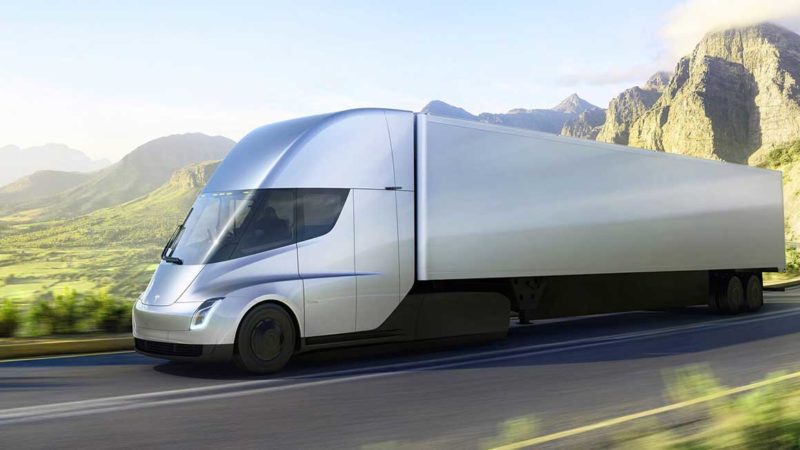Dutch electric vehicle expert Auke Hoekstra has taken to Twitter to explain why he believes electric trucks such as the Tesla Semi, rather than hydrogen-powered trucks, will corner the majority of the 40-tonne semi trailer and trucking market and replace diesel.
Hoekstra is a researcher at Eindhoven University of Technology in the Netherlands and the founder of Zenmo simulations, a zero-emission Energy & Mobility simulations lab seeking to provide scientific knowledge about energy and mobility systems. Hoekstra regularly takes to Twitter and YouTube to debunk EV myths and cheerlead the electric vehicle transition.
In a recent Twitter thread he responds to Bloomberg New Energy Finance founder Michael Liebreich’s comments about Daimler killing its hydrogen fuel cell car program, saying it was done “because the economics and poor efficiency will simply never make sense.”
Liebreich, conversely, believes that Daimler’s recent announcement that it was teaming up with Volvo Group to develop hydrogen fuel cells for heavy-duty and long-haul transport makes more sense.
I am aware of it. Catenary/pantograph solutions are very interesting. My guru on this is @AukeHoekstra, I know he's already a fan, and is working on detailed research into the economics. I'm awaiting the results with bated breath.
— Michael Liebreich (@MLiebreich) April 24, 2020
Liebreich’s contention is that while “Short-range trucking is going electric … long range hydrogen trucks have a chance of working” as against trucks fuelled by bio or synthetic fuels and battery electric vehicle or pantograph combinations. Liebreich then handballed to Auke Hoekstra on the specific value and suitability of catenary and pantograph solutions.
Hoekstra’s main contention that electric trucks will corner the semi-trucking market goes back to his debunking of “the future of trucks” findings published by the International Energy Agency in 2017, which failed to include electric trucks (but which has since been updated, a point Hoekstra makes up front).
In reaction to this thread of @MLiebreich (with reactions of @bryworthington) let me explain why I think eTrucks (not hydrogen, not trucks with catenary overheads) will corner most of the 40 tonnes heavy semi-trucking market and outcompete diesel.https://t.co/qq8xdLHxXx pic.twitter.com/cT736wnmyn
— AukeHoekstra (@AukeHoekstra) April 25, 2020
Adding a scenario of an electric truck with a 400 kilometre range, Hoekstra found that “it blew diesel and hydrogen out of the water with very little downsides” while adding that “Catenary is great too but requires international institutional cooperation” – a result Hoekstra is not holding his breath over.
The conclusion of Hoekstra’s research, based on a modern truck needing on average 1.3kWh/km and studies of how companies around the Port of Rotterdam drive, was that “a 1.3*750=975 kWh or 1 MWh battery can provide almost all trucks with the means to drive all day and charge overnight in the garage.”
This of course warrants questions about weight, but by redesigning trucks with electric motors close to the wheels, you save 3 tonnes using a 1MWh battery weighing in at 6 tonnes.
Let's suppose we use the cells of the current @Tesla Model 3 at 4 kg/kWh (https://t.co/swN3AqrJNk). Let's add 25% for the pack and 25% to provide an even better cycle life: 6kg/kWh.
That means the 1 MWh battery we need weights 6t (tonnes).
— AukeHoekstra (@AukeHoekstra) April 25, 2020
But as most trucks don’t need maximum capacity and with 40-tonne trucks causing the most CO2 emissions of all freight transport types, electrifying semi-trucks with batteries saves what Hoekstra describes as “an unparalleled amount of CO2 (and money!) per kWh of battery.”
This is important: 40t trucks cause the most CO2 emissions of all freight transport types.
If we electrify them we also use batteries to maximum effect because these trucks save an unparalleled amount of CO2 (and money!) per kWh of battery.
/end— AukeHoekstra (@AukeHoekstra) April 25, 2020
While it will be important not to necessarily cast all alternatives to the wind in a fit of battery electric vehicle pride and exuberance, and acknowledging the niche uses for hydrogen fuel cells – such as long-haul trucking – it is not difficult to see a future where a majority of medium- to large-sized trucking is powered by batteries.
This, of course, only reinforces the need to ensure the mining of base metals required for EV batteries is done as sustainably as possible, which points back to recent research which shows that mining these metals from polymetallic nodules from the deep seafloor of the Pacific Ocean would be less environmentally dangerous than relying on ores mined from traditional sources.
RenewEconomy and its sister sites One Step Off The Grid and The Driven will continue to publish throughout the Covid-19 crisis, posting good news about technology and project development, and holding government, regulators and business to account. But as the conference market evaporates, and some advertisers pull in their budgets, readers can help by making a voluntary donation here to help ensure we can continue to offer the service free of charge and to as wide an audience as possible. Thankyou for your support.
Joshua S. Hill is a Melbourne-based journalist who has been writing about climate change, clean technology, and electric vehicles for over 15 years. He has been reporting on electric vehicles and clean technologies for Renew Economy and The Driven since 2012. His preferred mode of transport is his feet.


